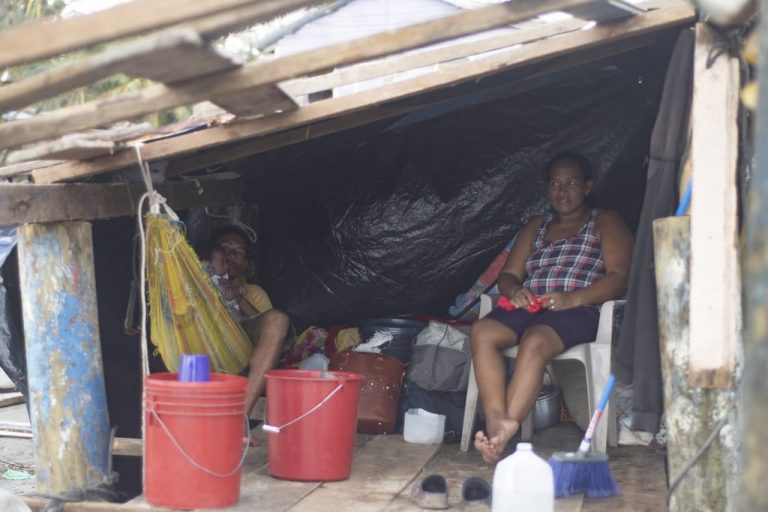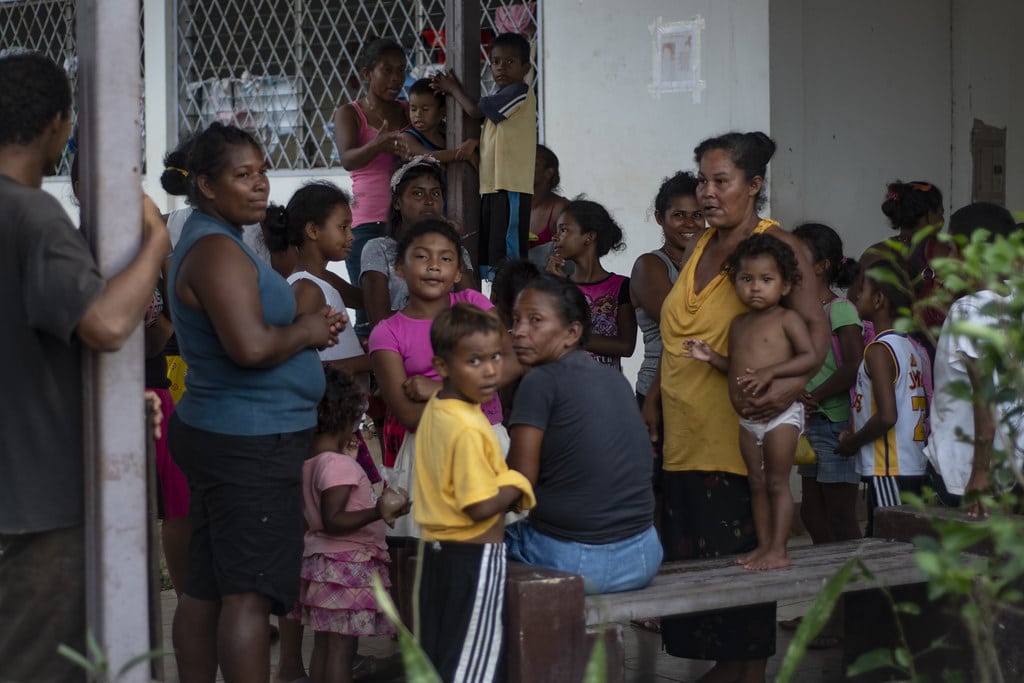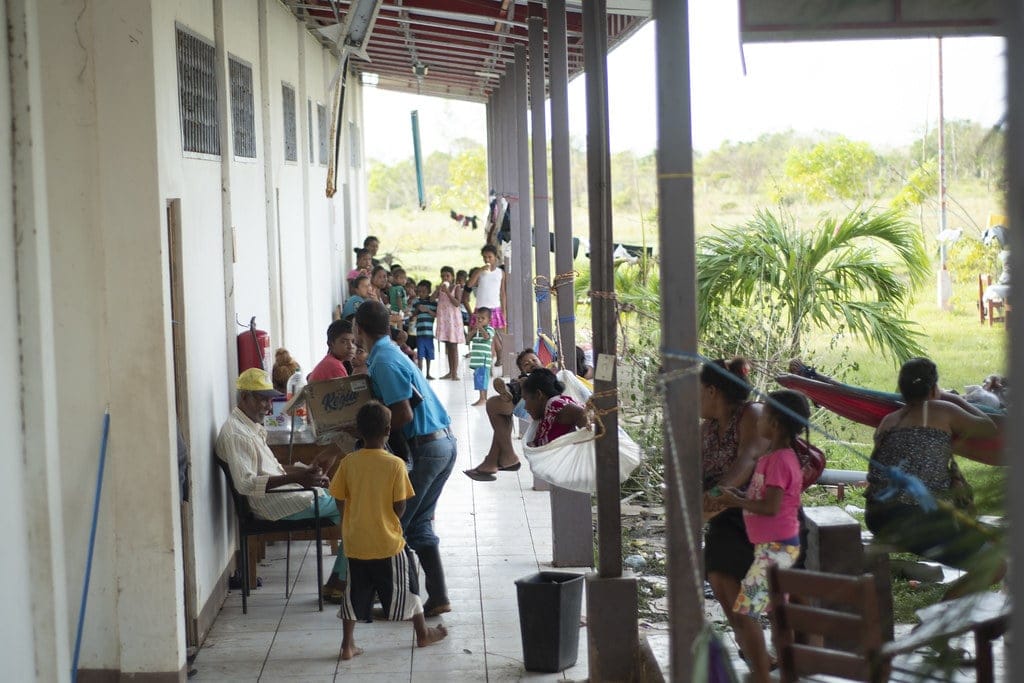4 de diciembre 2020

Children of Exile: The Births “Sowing Hope” in the Camp of Nicaraguan Farmers

PUBLICIDAD 1M
PUBLICIDAD 4D
PUBLICIDAD 5D
Doctors warn that Eta and Iota paved the way for an outbreak of the coronavirus pandemic in indigenous lands.

After hurricanes Eta and Iota hit
Overcrowding in shelters and the lack of hygiene measures in neighborhoods, after hurricanes Eta and Iota hit, have increased the risk of a Covid-19 outbreak in the North Caribbean Region of Nicaragua, warned the Pan-American Health Organization (PAHO). However, for this impoverished population, the pandemic is the least of their worries after losing all their assets in just two weeks.
In the “El Muelle” neighborhood of Bilwi, all the wooden houses were destroyed by both hurricanes. The few concrete buildings that remain standing now shelters dozens of residents of the area. In one of these makeshift shelters is Maria Williams with her six children. There, they all sleep on the floor, no one wears a mask and they “don’t even have water to drink,” she answers when asked about hygiene measures against Covid-19.
The situation in the shelters is a glimpse of what the entire region is experiencing. A taxi driver that we will call “Carlos” relates that in his tours of the urban area of Bilwi, he has noticed that those who wear a mask are “those who come from Managua.” For him, Covid-19 is a disease “from somewhere else.” He says that in this area of Nicaragua the most feared disease is malaria.
Limbord Bucardo is from the Bilwi Pri Laka Movement. He explains that even before the hurricane destruction, people had “lost their fear” of Covid-19 infections.
“Here (in Bilwi) you don’t hear much about Covid,” says Bucardo. “People have stopped wearing masks, hand washing has decreased in intensity.” Back in April and May, “when we went to the (mostly indigenous) communities, people did not want to approach us. They told us: ‘you come from the city, you bring Covid.” It was worse if they would see us with a mask. They said that: ‘You are wearing a mask because you have Covid’,” said Bucardo.
Epidemiologist Rafael Amador warns that a Covid-19 outbreak could happen in the short term. This because of “the social behavior that has occurred in Nicaragua towards relaxation and irresponsibility concerning the virus.” But also from the emergencies caused after the passage of hurricanes Eta and Iota.
“We saw many images in which it was evident that many people were transferred to shelters without the proper social distancing measures, without wearing masks and also without having access to water,” stressed the expert.

Shelter located in “Bluefields Indian and Caribbean University.” Photo: Elmer Rivas / Confidencial
Amador said it’s understandable “that when people ran out of their houses, they didn’t think about masks because they thought about saving their lives. However, it is important that they take care of themselves because Covid-19 does not spare you either.”
“The Government should assist them and take into account preventive measures. These are people who were left more vulnerable to the Covid-19 pandemic. Likewise, to other diseases such as malaria and dengue,” he pointed out.
Additionally, Dr. Ciro Ugarte, director of the PAHO Health Emergencies Department, indicated during a regional information session that the health emergency caused by hurricanes Eta and Iota, combined with the Covid-19 pandemic, “has a direct impact” on the health of the affected population.
The possibility of an increase in transmission of the coronavirus in shelters “is a matter of extreme importance,” emphasized Ugarte. Prevention measure used prior to the hurricane season “are the ones that are being activated at this time. Wearing masks, physical distancing, hand hygiene and the routine health control of the people is very necessary,” he stressed.
In the communities of the Miskito territory, which Bucardo used to visit, information about the pandemic was scarce. People learned about the coronavirus through the radio and the messages were not in their native language. “There were people who died with all the symptoms…but there is no record,” Bucardo highlights.
In the Waspam area alone, territorial leader Welcome Raymundo reports that, in the first months of the pandemic, ten people died with symptoms similar to Covid-19. However, they were never tested for coronavirus. Besides, indigenous people prefer to treat themselves with natural medicine.
According to Raymundo, people from the communities do not like to visit the hospital. “They say that they can get more infected at the hospital.” Another reason is the great distance they have to travel to get to the regional hospital, located in Bilwi.
Deborah Escobar, from the Center for Justice and Human Rights of the Atlantic Coast of Nicaragua (CEJUDHCAN), explains that this organization brought information about Covid-19, and humanitarian assistance to 52 indigenous communities in the Miskito territory. She said they also learned about suspicious deaths during the months of May, June, and July. However, they could not determine the exact number.
To deal with the pandemic, communal authorities “took self-protection measures such as having their own quarantine,” noted Escobar. They “didn’t leave the communities and didn’t allow anybody to enter. They also suspended communal assemblies and later churches opened but with distancing,” she continued.
In the Mayangna territories, information on Covid-19 was also scarce, explains a resident of the Sauni territory. “Marcos” requested anonymity for fear of being fired from his job. He said the Ministry of Health (MINSA) did not reach the communities to raise consciousness of the people about the pandemic. However, neither did they learn about people with coronavirus symptoms.

Shelter located in the Bluefields Indian and Caribbean University. Photo: Elmer Rivas / Confidencial
The health posts in the Bosawas reserve, where the Mayangna territory is located, “do not have conditions like in the cities, but the people did what they could. There were no deaths to regret,” he said.
Although “Marcos” does not know of any person from the Mayangna territory who has died with symptoms of Covid-19, he remembers that a teacher from Bilwi, who was a facilitator in the Bosawas area, died at the Bilwi hospital and a week after his wife.
The Covid-19 Citizens Observatory warned that between November 12 to 25, 41 irregularities were reported related to exposure of people in crowds, inadequate support by MINSA, infringements at private worklaces and an inadequate response to the emergency of Hurricane Iota.
“It was reported that in coastal neighborhoods of Bilwi and indigenous communities, severely affected by the hurricanes, masks are not used, there is overcrowding at shelters, and there is no access to water for hand washing,” they point out.
They also ask the Government to “ensure masks and urgent access to water.” Likewise, they also urge the use of “evacuation and shelter protocols taking into consideration the prevention of the pandemic.”
The Observatory recently warned about the risk communities in the North Caribbean are exposed to after the hurricanes. They recommend that urgent measures be implemented such as guaranteeing access to safe water and food distribution. Additionally, ensuring primary care services, generalized testing for Covid-19 and isolation of people who test positive.
There are several areas where there is already an “surge in Covid-19 cases,” notes the Covid Observatory. These include Chontales, Rivas and the South Caribbean, plus other areas affected by the rains of both hurricanes. The Covid-19 Citizens Observatory keeps sources identity anonymous, for fear of reprisals.
Nora Newball is the coordinator of the Kriol Communal Government of Bluefields. She explained that in recent weeks, prior to the arrival of the hurricanes, an increase in Covid-19 cases was already reported.
“We found out from neighbors, relatives and independent media outlets, such as “La Costenisima” radio. The Government remains silent on the cases,” she explained.
Newball said many infected people prefer to be treated at home “even with natural medicine” rather than going to hospitals. “They are afraid of being hospitalized and dying there.”
“In ‘Laguna de Perlas’ a whole family was infected and had to stay at home for several weeks. In Haulover, where I have several relatives, they were infected. People in communities are afraid to be intubated in the hospital and don’t report they are infected,” she said.
Archivado como:
PUBLICIDAD 3M
Confidencial es un diario digital nicaragüense, de formato multimedia, fundado por Carlos F. Chamorro en junio de 1996.
PUBLICIDAD 3D